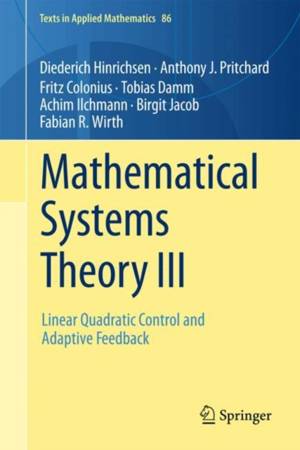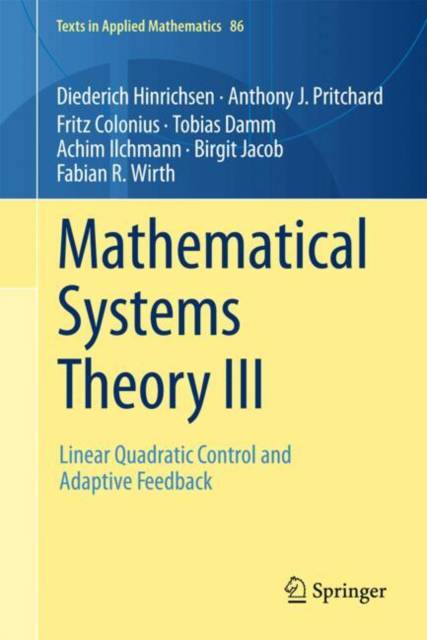
Bedankt voor het vertrouwen het afgelopen jaar! Om jou te bedanken bieden we GRATIS verzending (in België) aan op alles gedurende de hele maand januari.
- Afhalen na 1 uur in een winkel met voorraad
- In januari gratis thuislevering in België
- Ruim aanbod met 7 miljoen producten
Bedankt voor het vertrouwen het afgelopen jaar! Om jou te bedanken bieden we GRATIS verzending (in België) aan op alles gedurende de hele maand januari.
- Afhalen na 1 uur in een winkel met voorraad
- In januari gratis thuislevering in België
- Ruim aanbod met 7 miljoen producten
Zoeken
Mathematical Systems Theory III
Linear Quadratic Control and Adaptive Feedback
Diederich Hinrichsen, Anthony J Pritchard, Fritz Colonius, Tobias Damm, Achim Ilchmann, Birgit Jacob, Fabian R Wirth
€ 64,45
+ 128 punten
Omschrijving
This is the third and final volume of Mathematical Systems Theory. Like the preceding volumes, it presents the mathematical foundations of systems and control theory in a self-contained, comprehensive, detailed, and mathematically rigorous manner. The exposition proceeds from the very general to the more specific, with rigorous mathematics complemented by numerous illustrations and explanatory remarks. Volume III comprises two chapters and an appendix. In contrast to the first two volumes, only continuous-time systems are considered here. Chapter 9 addresses linear-quadratic optimal control and the Riccati equation, while Chapter 10 deals with zero dynamics and adaptive feedback regulation. Distinctive features include: - a comprehensive treatment of the linear-quadratic optimal control problem - a presentation of the bounded real and the Kalman-Yakubovich-Popov Lemma - a systematic development of spectral factorization - a study of the relative degree in state space and frequency domain - a detailed exposition of the Byrnes-Isidori form and zero dynamics - a development of the fundamentals of high-gain adaptive and funnel control. The book combines the characteristics of a detailed introductory textbook with those of a reference source. The material should be accessible to mathematics students after two years of study, as well as to engineering students with a strong mathematical background. It will be of value to researchers in systems theory, as well as to mathematicians and engineers seeking to acquire a solid understanding of the mathematical foundations of the topics outlined above.
Specificaties
Betrokkenen
- Auteur(s):
- Uitgeverij:
Inhoud
- Aantal bladzijden:
- 425
- Taal:
- Engels
- Reeks:
- Reeksnummer:
- nr. 86
Eigenschappen
- Productcode (EAN):
- 9783032084002
- Verschijningsdatum:
- 22/01/2026
- Uitvoering:
- Hardcover
- Formaat:
- Genaaid
- Afmetingen:
- 155 mm x 235 mm

Alleen bij Standaard Boekhandel
+ 128 punten op je klantenkaart van Standaard Boekhandel
Beoordelingen
We publiceren alleen reviews die voldoen aan de voorwaarden voor reviews. Bekijk onze voorwaarden voor reviews.









